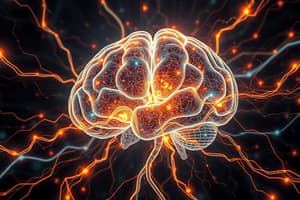Podcast
Questions and Answers
What does intellectual plasticity refer to?
What does intellectual plasticity refer to?
- The brain's ability to enhance emotional regulation and resilience
- The brain's capacity to manage emotions effectively
- The brain's ability to counteract age-related cognitive decline (correct)
- The brain's ability to adapt and respond to emotional experiences
Which of the following is NOT mentioned as a way to enhance emotional regulation?
Which of the following is NOT mentioned as a way to enhance emotional regulation?
- Cognitive-behavioral therapy
- Mindfulness practice
- Engaging in mentally stimulating tasks (correct)
- Neuroplastic changes from repeated emotional experiences
What is the primary benefit of understanding emotional plasticity?
What is the primary benefit of understanding emotional plasticity?
- Enhancing problem-solving skills
- Improving memory retention
- Promoting positive emotional adaptation and improving mental health (correct)
- Increasing intellectual plasticity
How do lifelong learning and engagement in mentally stimulating tasks impact cognitive function in old age?
How do lifelong learning and engagement in mentally stimulating tasks impact cognitive function in old age?
What role does emotional plasticity play in adapting to stressors?
What role does emotional plasticity play in adapting to stressors?
Flashcards are hidden until you start studying
Study Notes
Plasticity of Intellect and Emotion
Plasticity refers to the brain's ability to reorganize itself by forming new neural connections throughout life. This adaptability is crucial for learning, memory, perception, and recovery from injury or damage. In this article, we will explore how plasticity manifests in both intellectual and emotional aspects of our lives, highlighting its importance and potential applications.
Intellectual Plasticity
Intellectual plasticity encompasses the brain's capacity to learn and adapt in response to experiences. It plays a critical role in cognitive development and can enhance cognitive processes such as attention and working memory. Some key aspects of intellectual plasticity include:
Innate vs. Learned Intelligence
While some individuals may possess innate intelligence, intellectual plasticity allows us to develop skills and knowledge through experience. This form of plasticity is particularly evident during childhood when the brain is more malleable, allowing for rapid learning and adaptation.
Environmental Enrichment
Environmental factors can significantly impact intellectual plasticity. Stimulating environments, such as those with diverse social interactions and mental challenges, promote neuronal growth and synaptic plasticity. Similarly, depriving individuals of these stimuli can have detrimental effects on their cognitive abilities.
Aging and Intellectual Plasticity
Although aging typically leads to decreased cognitive function, studies suggest that intellectual plasticity remains present even into old age. Lifelong learning and engagement in mentally stimulating tasks can counteract age-related cognitive decline.
Emotional Plasticity
Emotional plasticity refers to the brain's ability to adapt and respond to emotional experiences. It plays a vital role in regulating emotions and adapting to stressors. Some aspects of emotional plasticity include:
Emotional Regulation
Emotional regulation involves the ability to recognize, understand, and manage emotions effectively. Neuroplastic changes in response to repeated emotional experiences can enhance an individual's capacity for emotional regulation and resilience.
Therapeutic Implications
Understanding emotional plasticity offers opportunities for interventions designed to promote positive emotional adaptation and improve mental health. Techniques such as cognitive-behavioral therapy and mindfulness practice can facilitate neuronal remodeling and foster emotional resilience.
Conclusion
Plasticity is a fundamental aspect of brain function, underpinning learning, memory, perception, and emotional processes. Intellectual and emotional plasticity allow us to adapt and grow throughout life, enabling us to overcome challenges and thrive in various environments. Continued exploration of these phenomena promises valuable insights into human development and provides the foundation for innovative therapeutic approaches.
Studying That Suits You
Use AI to generate personalized quizzes and flashcards to suit your learning preferences.



